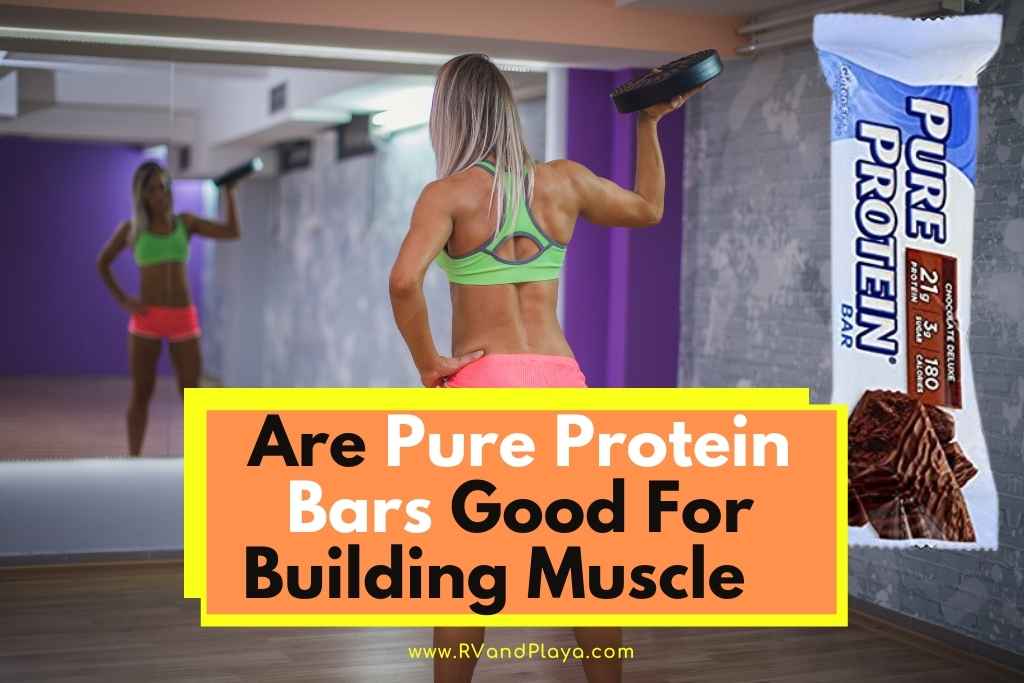Do you know if Pure protein bars are good for building muscle? this is one of the questions our readers ask a lot. Well, we´ve got you covered.
For those looking to get stacked, using protein supplements is generally a great way to build muscle fast.
Protein bars are a convenient grab-and-go snack that are packed full of protein and contain plenty of other nutrients to promote muscle repair and build muscle after a workout.
There are a wealth of different protein bar brands out there so let’s look at one of the most popular, Pure Protein bars.
So, are Pure protein bars good for building muscle? Yes, Pure Protein Bars are a great way to build muscle in addition to a balanced and high protein diet. Each Pure Protein Bar contains on average 20 grams of protein per bar, which equates to a little over ⅓ of your daily requirement.
This amount of protein provides enough to transfer amino acids and help build, repair, and maintain muscle tissue.
Table of Contents
Why is Protein So Good for Building Muscle?
It’s no longer a secret that to get ripped you need to have a high-protein diet, so what makes protein so good for building and maintaining muscle?
Building muscle requires you to slightly tear the muscle tissue each time you work out.
These muscle tears heal and rebuild and protein contains the essential amino acids that help your muscles repair faster and build up stronger after exercise.
Click the link to Amazon and get the Best Protein Bars for Building Muscle Today!
Leucine
Of all nutrients, the single amino acid called leucine is the beast when it comes to building muscle.
There’s a long, winding scientific explanation as to ‘why’ the branched-chain amino acid (BCAA) leucine is so good for building muscle mass, but we can summarize this by simply saying that it stimulates muscle protein synthesis more than any other nutrient.
Protein Types in Pure Protein Bars
Leucine is found in a wide range of food sources and high leucine foods include chicken, beef, pork, tuna, tofu, canned beans, and dairy products.
Most protein bars, including Pure Protein Bars, take advantage of this and use dairy-based protein, most commonly milk protein isolate and whey protein isolate.
Read also: Are Pure Protein Bars Gluten-Free?
How Much Protein Does My Body Need to Build Muscle?
This all depends on your weight and your fitness or muscle-building goals. The World Health Organisation (WHO) recommends 0.83 grams per kilogram of body weight each day.
The recommended daily allowance (RDA) of protein for US adults is 0.8 g protein/kg body weight/day.
If you’re looking to bulk up, then you’ll need to increase that figure considerably.
The International Society of Sports Nutrition suggests that a protein intake in the range of 1.4–2.0 g/kg/day is required to build muscle mass, which is 98-140g of protein per day for a 70 kg person.
For people serious about bodybuilding, then many coaches will prescribe around 225 grams of protein per day for competing athletes weighing around 90 kg.
This is more than three times the recommended amount of daily protein consumption, and many will argue this is excessive for anything but extreme weight training.
Fast and Slow Protein
Not all protein is created equal, and differing types of ingredients that contain the protein are consumed at differing rates by the body.
This is because protein gets metabolized into amino acids and then is absorbed by the muscle tissues.
- Egg/Soy/Rice protein gets absorbed at a rate of fewer than 3 grams per hour (Slow/Medium)
- Casein absorbs at a rate of 6.1 grams per hour (Medium)
- Whey absorbs at 8-10 grams per hour (Fast)
Bodybuilders will tend to opt for ‘fast’ protein with dairy-based protein such as whey protein being preferred.
Pure manufactures all of their Pure Proteins Bars with a combination of dairy and soy-based protein, with most prominently featuring whey protein.
Experienced bodybuilders also use a varied approach, consuming a combination of fast and slow metabolizing protein ingredients throughout the day.
Read also: Are Pure Protein Bars Low FODMAP?
Sources of Protein
While Pure Protein Bars go a long way to giving your daily protein intake a boost, they should be consumed alongside a healthy, high-protein-based diet.
It is not recommended to use Pure Protein Bars as your only source of protein. Other foods such as lean turkey thigh and beef skirt steak are excellent sources of protein.
Let’s look at a few food types that are high in protein and the amino acid Leucine (essentially the building block for muscle mass).
White meats
- 6oz roasted chicken breast = 165% RDI (Recommended Daily Intake) of leucine
- 6oz of lean ground turkey = 163% RDI of leucine
- 6oz of roasted turkey breast = 116% RDI of leucine
- 1 large pork chop = 165% RDI of leucine
Red Meats
- 6oz beef skirt steak = 183% RDI of leucine
- 6oz roasted lamb shoulder = 172% RDI of leucine
- 6oz ribeye (Filet) steak = 135% RDI of leucine
- 6oz braised beef = 84% RDI of leucine
Fish
- 6oz tuna filet = 151% RDI leucine
- 6oz salmon fillet = 136% RDI of leucine
- 6oz tilapia fillet = 127% RDI of leucine
Summary
Pure Protein Bars are a great way to build muscle and should be considered as a protein supplement within a balanced and protein-rich diet plan.
They’re a quick and easy way to get that extra boost of protein on the go, so there’s no excuse to skip leg day! Oh, and they come in a range of great flavors too.
Whatever you do, don’t rely on them as food substitutes, and make sure you gain protein from various other food groups too and you’ll be well on the way to rock-hard abs and a chest of steel!
Here are some of my favorite services, products, and Stores
There are affiliate links, so if you do decide to use any of them, I´ll earn a small commission. But in all honesty, these are the exact what I use and recommend to everyone, even my own family.
To see all my of most up-to-date recommendations, check out this resource that I made for you!
+ Products & Services
+ Convenience Stores
+ Save Thousands of Dollars
References
https://pubmed.ncbi.nlm.nih.gov/23551944/
https://reflexnutrition.com/blogs/community/fast-and-slow-proteins-choose-wisely-for-maximum-results
Recent Posts
Do you know if ONE protein bars are vegan? this is one of the questions our readers ask a lot. Well, we´ve got you covered. Looking for healthy, vegan protein bars that will help make you feel...
Are Kirkland Protein Bars Healthy (Ingredients, Bad or Good)
Kirkland Protein Bars Review. Ever since their conception, Kirkland Signature Protein Bars have been making happy eaters out of Costco’s customer base. Consumers have long lauded them as both a...


